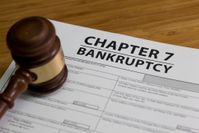
When financial burdens become too great to bear and debt relief seems unattainable, bankruptcy provides a crucial lifeline. However, before you file, you'll need to decide between Chapter 7 bankruptcy and Chapter 13 bankruptcy. While both options provide workable solutions for reclaiming your financial freedom, there are several differences between these two types of bankruptcy.
3 Key Differences Between Chapter 7 & Chapter 13 Bankruptcy
1. Chapter 7 Bankruptcy Offers Debt Forgiveness
 Under Chapter 7 bankruptcy, most of your unsecured debt will be eliminated by the courts. Credit card balances, back rent, medical charges, and utility bills will all be forgiven. Notable exceptions include student loans and child support payments. Chapter 13 bankruptcy, on the other hand, is a debt repayment plan. Under this claim, you will work with your creditors and the courts to consolidate your bills into manageable monthly payments.
Under Chapter 7 bankruptcy, most of your unsecured debt will be eliminated by the courts. Credit card balances, back rent, medical charges, and utility bills will all be forgiven. Notable exceptions include student loans and child support payments. Chapter 13 bankruptcy, on the other hand, is a debt repayment plan. Under this claim, you will work with your creditors and the courts to consolidate your bills into manageable monthly payments.
2. Chapter 13 Permanently Stops Foreclosure
When filing for bankruptcy of any kind, a hold is issued on any foreclosure action. With Chapter 13, that hold is permanent—as long as you are making a solid effort to repay your mortgage obligations, a foreclosure cannot legally move forward. With Chapter 7 bankruptcy, the hold is only temporary, and many filers find letting go of property is beneficial to getting back on track.
3. The Timeframes for Chapter 7 & 13 Bankruptcy Differ
While both Chapter 7 and Chapter 13 bankruptcy filings will stay on your credit report for approximately 10 years, the timeframes involved in discharging the debt are quite different. Chapter 7 bankruptcy discharges debt quickly, usually within a few months. Chapter 13 bankruptcy discharges debt only when the terms of the repayment plan are successfully met—a process which can take three to five years.
Harry B. Zornow is a bankruptcy attorney with more than 30 years of experience serving the Hamilton, Ohio, area. To schedule a consultation, call (513) 737-9770 or visit the website. Find out which type of bankruptcy is best for your situation to begin building a brighter financial future today.
About the Business
(25 reviews)
Have a question? Ask the experts!
Send your question

